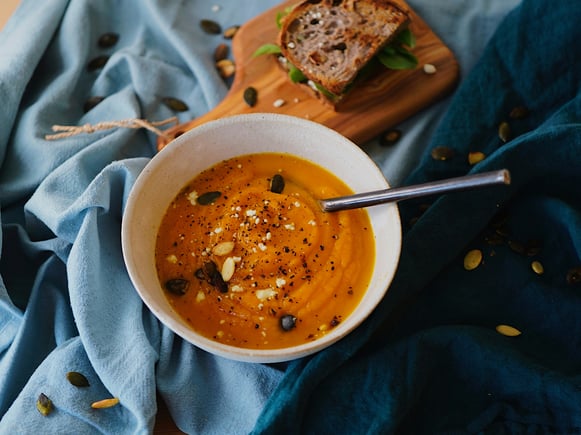
Many things come to mind when we think of the holidays, but high on the list is food. From Thanksgiving through the New Year, fabulous, festive fare is front of mind.
But all that feasting can come at a cost, especially for older adults whose dietary needs have likely changed.
While much of what’s in holiday goodies – sugar, salt, fat – are what make them so irresistible, these ingredients are particularly unhealthy for older people.
How can seniors enjoy the holidays and also maintain nutritious eating habits?
First, let’s look at how our tastes literally change.
The Aging Palate
Humans are born with over 10,000 taste buds, but we have fewer of them as we age. Those we retain become less sensitive, and we don’t taste or smell things as we once did.
Taste insensitivity occurs first with salty and bitter foods, causing many older adults to salt their food more heavily than before.
On the flip side, people retain the ability to taste sweet things the longest, making us more apt to overindulge in sugary foods as we grow older.
Best Foods (and Holiday Recipes!) for Older Adults
In order to maintain optimal health all year long and stave off some of the more common ailments associated with aging (heart disease, osteoporosis, diabetes, certain cancers and compromised brain function), the Academy of Nutrition and Dietetics recommends the following dietary staples:
- Berries: Packed with antioxidants, berries are powerhouses in the reduction of cancer risk and cognitive decline. Blueberries and cranberries can help prevent bladder infections (common among seniors); blueberries and raspberries promote healthy vision due to their high lutein content.
- Try this slowed-cooked turkey with berry compote recipe.
 Squash and pumpkin seeds are not only prevalent this time of year, they are also high in heart-healthy nutrients such as vitamin C, magnesium, potassium and folate.
Squash and pumpkin seeds are not only prevalent this time of year, they are also high in heart-healthy nutrients such as vitamin C, magnesium, potassium and folate.
- Try this pumpkin seed recipe and see why they pack such a healthy punch!
- Dark, leafy greens (spinach, kale, broccoli, most lettuces, bok choy, etc.) contain many of the essential vitamins and minerals we need as we age. Just one cup of cooked spinach contains 36% of our daily requirement, while broccoli contains both calcium and vitamin K for good bone health.
- Try this yummy cranberry almond spinach salad recipe.
- Citrus fruits are high in vitamin C, a powerful antioxidant and immune function booster. Vitamin C also helps with iron absorption and can be found in red/yellow peppers as well as tomatoes.
- Try this healthy, gluten-free lemon bar recipe.
- Tomatoes, high in lycopene (another powerful antioxidant), help protect cells from the damaging free radicals associated with heart disease, dementia and Alzheimer’s.
- Try these fun, festive tomato recipes the whole family will love!
- Whole grain breads, cereals and pasta are rich in vitamins B6, B12 and folic acid, which may help improve memory. Whole grains are complex carbohydrates that release energy slowly, maintaining healthy blood sugar levels; they are also high in fiber, helping to regulate the GI system.
- Try this Swedish apple cranberry pie recipe, packed with whole grains.
- Low-fat milk and yogurt boost hip bone density, as they are rich in vitamin D and calcium, and contain lower levels of saturated fat than other dairy products. Beware of unpasteurized milk, too much lactose and too much dairy in general, as this has been linked to some cancers.
- Try this festive frozen yogurt bark recipe.
- Lean meats and other proteins are key players in a healthy diet for older adults. Adequate protein is a must for seniors, who are at risk for a decrease in reserve capacity, skin resilience, immune function and poor healing from injury or illness. Good choices are lean meats with no skins or marbling, such as chicken breast and lean cuts of beef with no more than 8% fat. For those who don’t eat meat, other good sources of protein are legumes, nuts (not too many because of the high fat content), green peas, quinoa and tofu.
- Try this mouth-watering roast beef tenderloin with red wine sauce recipe.
- Fish: The omega-3 fatty acids found in some fish boost heart health, decrease triglycerides and reduce blood pressure and clotting. Choose such fish as Alaskan salmon, Pacific halibut and white albacore tuna; avoid orange roughy, swordfish and fried fish.
- Try this colorful Christmas baked salmon recipe.
- The MIND Diet: Learn here how the foods listed above and a few more have been found to improve cognitive function.
- Try these tasty MIND Diet recipes, chock full of the nutrients that power your brain!
- Water, water, water…the importance of adequate water intake cannot be overstated. A study from the National Institutes of Health found that well-hydrated older adults may live longer than those who do not consume enough water. Following the “8 by 8” rule (8 glasses of water, 8 ounces each) per day nourishes cells, lubricates joints, acts as a shock absorber for the brain and spinal cord, facilitates major bodily functions and flushes out toxins, to name just a few of the many benefits of H20.
Let’s Talk Turkey
Much could be written about the health benefits of turkey, but here are some of the highlights. The most popular meat consumed during the holidays, turkey is:
 Lower in fat and richer in protein than chicken
Lower in fat and richer in protein than chicken - A good source of B3, B6 and B12 vitamins
- Rich in zinc, phosphorus, iron and selenium, supporting thyroid function, immunity, bone health and energy production
- Linked to reduced risk of bladder, breast, lung and stomach cancer
- A low glycemic index food, helping to reduce blood sugar spikes and manage diabetes
- Helpful in increasing “good” HDL cholesterol
- Part of the MIND diet, boosting brain health
- Rich in tryptophan, an amino acid that boosts mood and sleep
Chances are, you may have some leftover turkey this year. Check out all these healthy leftover turkey recipes!
Easy Does It
Holiday stress can be harder on older people, and most have lived long enough to realize it isn’t the shopping, decorating and frenetic pace that matters…it’s gathering at the table with loved ones celebrating the real reason for the season.
This year, why not pare down the “Holi-daze” and focus on what’s most important? Dear friends, beloved family and, yes, great food that’s good for all!





